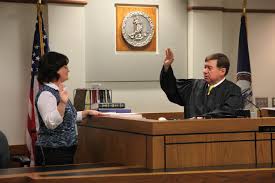 The Louisiana Department of Natural Resources complained that it was not able to call live witnesses at an arbitration with FEMA, conducted under federal regulations by the Civilian Board of Contract Appeals. Agreeing that the regulations allowed oral presentation of evidence, but also noting the fulsome written submission received without objection, the Fifth Circuit observed: “Vacatur . . . is warranted when the panel refuses to hear material, not just any, evidence; similarly, there is no indication oral presentation ‘might have altered the outcome of the arbitration.'” Louisiana Dep’t of Natural Resources v. FEMA, No. 17-30140 (Jan. 29, 2018, unpublished) (emphasis added).
The Louisiana Department of Natural Resources complained that it was not able to call live witnesses at an arbitration with FEMA, conducted under federal regulations by the Civilian Board of Contract Appeals. Agreeing that the regulations allowed oral presentation of evidence, but also noting the fulsome written submission received without objection, the Fifth Circuit observed: “Vacatur . . . is warranted when the panel refuses to hear material, not just any, evidence; similarly, there is no indication oral presentation ‘might have altered the outcome of the arbitration.'” Louisiana Dep’t of Natural Resources v. FEMA, No. 17-30140 (Jan. 29, 2018, unpublished) (emphasis added).
Monthly Archives: January 2018
 The problem in LeJeune v. JFK Capital Holdings LLC was the following: “Two approaches for determining the appropriate ‘commission’ for Chapter 7 trustees have emerged in recent years. Under the first approach, some courts hold that Section 326(a) is not simply a maximum but also a presumptively reasonable fixed commission rate to be reduced only in rare instances.Other courts hold that the presumptively reasonable approach is nonetheless subject to adjustment in ‘extraordinary circumstances.’ Some courts similarly presume that the Section 326(a) percentages are reasonable, but perform a more in-depth review of the trustee’s services to ensure the presumption is justified.'” (citations omitted). After reviewing the applicable statutes, the Fifth Circuit aligned itself with the first approach and the analysis of Mohns, Inc. v. Lanser, 522 B.R. 594, 601 (E.D. Wis.), aff’d sub nom. In re Wilson, 796 F.3d 818 (7th Cir. 2015). No. 16-31151-CV (Jan. 26, 2018).
The problem in LeJeune v. JFK Capital Holdings LLC was the following: “Two approaches for determining the appropriate ‘commission’ for Chapter 7 trustees have emerged in recent years. Under the first approach, some courts hold that Section 326(a) is not simply a maximum but also a presumptively reasonable fixed commission rate to be reduced only in rare instances.Other courts hold that the presumptively reasonable approach is nonetheless subject to adjustment in ‘extraordinary circumstances.’ Some courts similarly presume that the Section 326(a) percentages are reasonable, but perform a more in-depth review of the trustee’s services to ensure the presumption is justified.'” (citations omitted). After reviewing the applicable statutes, the Fifth Circuit aligned itself with the first approach and the analysis of Mohns, Inc. v. Lanser, 522 B.R. 594, 601 (E.D. Wis.), aff’d sub nom. In re Wilson, 796 F.3d 818 (7th Cir. 2015). No. 16-31151-CV (Jan. 26, 2018).
Plan your next New Orleans trip with the 2018 Mardi Gras parade schedule!
 A textbook example of a deposition admission appears in Peters v. Jazz Casino Co.:
A textbook example of a deposition admission appears in Peters v. Jazz Casino Co.:
Peters also asserts that the hose was obstructing the walkway, which constituted an unreasonable defect. However, his testimony at the deposition does not support the assertion that the hose obstructed the walkway. In fact, when asked if he had any recollection of the red hose obstructing someone walking on the sidewalk, he responded: “I don’t recall that.” Thus, there is insufficient evidence to create a fact issue as to whether the hose obstructed the walkway.
No. 17-20625 (Jan. 22, 2018, unpublished).
 A threshold issue in Hacienda Records LP v. Hacienda Records & Recording Studio, Inc. was whether a ruling about appellants’ standing, in another related action, was entitled to collateral estoppel effect. At the time of the district court’s decision, the other court’s ruling was not final for appeallate purposes. Finding that all elements but one were clearly established, and that the policies behind preclusion doctrines would be well-served by applying collateral estoppel here, the Fifth Circuit noted that with one notable exception, “our court has consistently followed the strict approach to finality, linking the availability of appeal for the prior decision with finality for collateral-estoppel purposes.” The Court then declined to address that issue, accepting and agreeing wiht the district court’s conclusion that “although . . . ‘the doctrine of collateral estoppel does not apply here,’ ‘the court nonetheless agree[s] with the reasoning and conclusions reached” by the other court. No. 16-41180 (Jan. 4, 2018).
A threshold issue in Hacienda Records LP v. Hacienda Records & Recording Studio, Inc. was whether a ruling about appellants’ standing, in another related action, was entitled to collateral estoppel effect. At the time of the district court’s decision, the other court’s ruling was not final for appeallate purposes. Finding that all elements but one were clearly established, and that the policies behind preclusion doctrines would be well-served by applying collateral estoppel here, the Fifth Circuit noted that with one notable exception, “our court has consistently followed the strict approach to finality, linking the availability of appeal for the prior decision with finality for collateral-estoppel purposes.” The Court then declined to address that issue, accepting and agreeing wiht the district court’s conclusion that “although . . . ‘the doctrine of collateral estoppel does not apply here,’ ‘the court nonetheless agree[s] with the reasoning and conclusions reached” by the other court. No. 16-41180 (Jan. 4, 2018).
 Calderone alleged that he was terminated, in retaliation for reporting a car dealership’s alleged refusal to finance cars for racial minorities, in violation of the Consumer Financial Protection Act. Unfortunately for Calderone, no matter how reasonable his belief may have been, car dealers are exempt from the CFPA by its plain terms, as other agencies have regulatory authority in that sector of the economy. “Under the CFPA, a plainitff may have a reasonable, but mistaken, belief of fact or law that a statute has been violated. But the CFPA does not permit a plaintiff’s reasonable beliefs to expand the CFPB’s jurisdiction.” Calderon v. Sonic Houston JLR, L.P., No. 17-20029 (Jan. 9, 2018).
Calderone alleged that he was terminated, in retaliation for reporting a car dealership’s alleged refusal to finance cars for racial minorities, in violation of the Consumer Financial Protection Act. Unfortunately for Calderone, no matter how reasonable his belief may have been, car dealers are exempt from the CFPA by its plain terms, as other agencies have regulatory authority in that sector of the economy. “Under the CFPA, a plainitff may have a reasonable, but mistaken, belief of fact or law that a statute has been violated. But the CFPA does not permit a plaintiff’s reasonable beliefs to expand the CFPB’s jurisdiction.” Calderon v. Sonic Houston JLR, L.P., No. 17-20029 (Jan. 9, 2018).
 “[A]lthough a loan provides money to the borrower that can be used for temporary economic gain, it is offset by a future obligation to repay. As there is no overall
“[A]lthough a loan provides money to the borrower that can be used for temporary economic gain, it is offset by a future obligation to repay. As there is no overall
improvement in the borrower’s economic situation, there is no gain to be taxed. This contrasts with the taxable treatment of embezzled or misappropriated
funds. A leading tax treatise calls this the ‘theft-loan dichotomy’ that James [v. United States, 366 U.S. 213 (1961)]s] ‘no consensual recognition of an obligation to repay’ requirement seeks to enforce.” (other citations omitted). Accordingly: “‘A mutual understanding that Sun would ‘return some money to Mr. Cheung at some point’ is thus not enough to constitute the bona fide loan that would allow Sun to avoid reporting as income the millions he used to gamble, to bolster the financial condition of his
company, and to produce investment returns that he retained and commingled
with his other funds.” Sun v. Commissioner, No. 16-60270 (Jan. 18, 2018).
 The White House has announced President Trump’s intent to nominate Judge Edward Prado as Ambassador to Argentina, after thirty-five years of dedicated service in the federal judiciary. This appointment means that President Trump will name six judges to the Fifth Circuit – Judges Willett and Ho have taken office, two nominations are currently pending, and Judge Prado’s departure will mean two open seats.
The White House has announced President Trump’s intent to nominate Judge Edward Prado as Ambassador to Argentina, after thirty-five years of dedicated service in the federal judiciary. This appointment means that President Trump will name six judges to the Fifth Circuit – Judges Willett and Ho have taken office, two nominations are currently pending, and Judge Prado’s departure will mean two open seats.
 Ramos contended that the trial court should not have excluded some of his testimony under the “sham-affidavit rule,” observing that his declaration was given before his deposition. The Fifth Circuit disagreed: “It is the competency, rather than timing, of evidence with which the sham-affidavit rule is concerned.” And it agreed with the district court that the testimony was in fact inconsistent, noting as an example that “Ramos the declarant stated Hacienda ‘never paid him any monies or royalties,’ but Ramos the deponent admitted he couldn’t remember whether he had been paid. Memories, of course, may fade over time; but, that is a far cry from Ramos,at his deposition, being unable to recall many of the events he had stated as fact in his declaration, just four days prior.” Hacienda Records LP v. Hacienda Records & Recording Studio, Inc., No. 16-41190 (Jan. 4, 2018).
Ramos contended that the trial court should not have excluded some of his testimony under the “sham-affidavit rule,” observing that his declaration was given before his deposition. The Fifth Circuit disagreed: “It is the competency, rather than timing, of evidence with which the sham-affidavit rule is concerned.” And it agreed with the district court that the testimony was in fact inconsistent, noting as an example that “Ramos the declarant stated Hacienda ‘never paid him any monies or royalties,’ but Ramos the deponent admitted he couldn’t remember whether he had been paid. Memories, of course, may fade over time; but, that is a far cry from Ramos,at his deposition, being unable to recall many of the events he had stated as fact in his declaration, just four days prior.” Hacienda Records LP v. Hacienda Records & Recording Studio, Inc., No. 16-41190 (Jan. 4, 2018).
 Plaintiffs, represented by the same counsel, sought to consolidate two actions in state court; the defendant removed under CAFA’s “mass action” provision. A Fifth Circuit panel majority affirmed the denial of Plaintiff’s motion to remand, rejecting arguments about timeliness, retroactivity, and CAFA’s text. The majority reasoned that “it is the mass action, not claims against particular defendants, that is removable,” and that the plaintiff’s motion satisfied the CAFA requirement of “100 or more persons . . . proposed to be tried jointly on the ground that the plaintiffs’ claims involve common questions of law or fact.” A dissent would remand based on CAFA’s “not-retroactivity” language, as one of the state cases was filed before CAFA took effect. Lester v. Exxon Mobil Corp., No. 14-31383 (Jan. 9, 2018).
Plaintiffs, represented by the same counsel, sought to consolidate two actions in state court; the defendant removed under CAFA’s “mass action” provision. A Fifth Circuit panel majority affirmed the denial of Plaintiff’s motion to remand, rejecting arguments about timeliness, retroactivity, and CAFA’s text. The majority reasoned that “it is the mass action, not claims against particular defendants, that is removable,” and that the plaintiff’s motion satisfied the CAFA requirement of “100 or more persons . . . proposed to be tried jointly on the ground that the plaintiffs’ claims involve common questions of law or fact.” A dissent would remand based on CAFA’s “not-retroactivity” language, as one of the state cases was filed before CAFA took effect. Lester v. Exxon Mobil Corp., No. 14-31383 (Jan. 9, 2018).
U .S. Energy Devel. Corp. v. CL III Funding Holding Co. applied the attorneys’ fees provision of the form Joint Operating Agreement in Texas, which says: “Costs and Attorneys’ Fees: In the event any party is required to bring legal proceedings to enforce any financial obligation of a party hereunder, the prevailing party in such action shall be entitled to recover all court costs, costs of collection, and a reasonable attorney’s fee, which the lien provided for herein shall also secure.” The Fifth Circuit concluded that none of the four legal actions involved in the fee request involved a “financial obligation” within the meaning of the provision. No. 17-50217 (Jan. 10, 2018, unpublished).
.S. Energy Devel. Corp. v. CL III Funding Holding Co. applied the attorneys’ fees provision of the form Joint Operating Agreement in Texas, which says: “Costs and Attorneys’ Fees: In the event any party is required to bring legal proceedings to enforce any financial obligation of a party hereunder, the prevailing party in such action shall be entitled to recover all court costs, costs of collection, and a reasonable attorney’s fee, which the lien provided for herein shall also secure.” The Fifth Circuit concluded that none of the four legal actions involved in the fee request involved a “financial obligation” within the meaning of the provision. No. 17-50217 (Jan. 10, 2018, unpublished).
 While both sides made cogent policy arguments, plain meaning triumphed in Morgan v. Huntington Ingalls, and the Fifth Circuit held that the thirty-day removal deadline begins to run from receipt of a deposition transcript that may create a basis for removal, rather than the oral testimony
While both sides made cogent policy arguments, plain meaning triumphed in Morgan v. Huntington Ingalls, and the Fifth Circuit held that the thirty-day removal deadline begins to run from receipt of a deposition transcript that may create a basis for removal, rather than the oral testimony  itself. “[P]aper” is defined as “[a] written or printed document or instrument.” “[R]eceipt” is defined as the “[a]ct of receiving; also, the fact of receiving or being received; that which is received.” “Copy” is defined as “[t]he transcript or double of an original writing.” “‘Ascertain’ means ‘to make certain, exact, or precise’ or ‘to find out or learn with certainty.’” No. 17-30523 (Jan. 11, 2018).
itself. “[P]aper” is defined as “[a] written or printed document or instrument.” “[R]eceipt” is defined as the “[a]ct of receiving; also, the fact of receiving or being received; that which is received.” “Copy” is defined as “[t]he transcript or double of an original writing.” “‘Ascertain’ means ‘to make certain, exact, or precise’ or ‘to find out or learn with certainty.’” No. 17-30523 (Jan. 11, 2018).
 As a further reminder that “standing,” in all of the forms that idea takes, is a complicated set of doctrines, the Fifth Circuit held in Nevarez Law Firm v. Dona Ana Title Co.: “The district court relief on Rule 12(b)(1) when it dismissed Nevarez’s [RICO and state tort] claims with prejudice after concluding that there was no standing. That was error. ‘A dismissal with prejudice is a final judgment on the merits.’ We agree with an earlier opinion of this court that ‘to dismiss with prejudice under Rule 12(b)(1) is to disclaim jurisdiction and then exercise it.'” No. 17-50053 (Jan. 3, 2018, unpublished) (citations omitted).
As a further reminder that “standing,” in all of the forms that idea takes, is a complicated set of doctrines, the Fifth Circuit held in Nevarez Law Firm v. Dona Ana Title Co.: “The district court relief on Rule 12(b)(1) when it dismissed Nevarez’s [RICO and state tort] claims with prejudice after concluding that there was no standing. That was error. ‘A dismissal with prejudice is a final judgment on the merits.’ We agree with an earlier opinion of this court that ‘to dismiss with prejudice under Rule 12(b)(1) is to disclaim jurisdiction and then exercise it.'” No. 17-50053 (Jan. 3, 2018, unpublished) (citations omitted).
 A unanimous en banc opinion simplified the Fifth Circuit’s test for “whether a contract for performance of specialty services to facilitate the drilling or production of oil or gas on navigable waters is maritime.” The Court now asks: “First, is the contract one to provide services to facilitate the drilling or production of oil and gas on navigable waters? . . . Second, if the answer to the above question is ‘yes,’ does the contract provide or do the parties expect that a vessel will play a substantial role in the completion of the contract?” Larry Doiron, Inc. v. Jackson , No. 16-30217 (revised Jan. 11, 2018).
A unanimous en banc opinion simplified the Fifth Circuit’s test for “whether a contract for performance of specialty services to facilitate the drilling or production of oil or gas on navigable waters is maritime.” The Court now asks: “First, is the contract one to provide services to facilitate the drilling or production of oil and gas on navigable waters? . . . Second, if the answer to the above question is ‘yes,’ does the contract provide or do the parties expect that a vessel will play a substantial role in the completion of the contract?” Larry Doiron, Inc. v. Jackson , No. 16-30217 (revised Jan. 11, 2018).
 The question in Peake v. Ayobami was whether a bankruptcy debtor, who asserts a 100% exemption as to a particular estate asset, is asserting that exemption as to the asset itself or its value. The practical consequence is whether “claiming a 100% interest in an asset as exempt allows the debtor to ‘walk away’ with the asset itself and potentially benefit from any post-petition appreciation of it.” The Fifth Circuit gave a limited answer, noting that the statute allows the debtor to claim “a 100% interest in an asset,” and also noting Supreme Court precedent that expressed skepticism about whether a debtor could use this ability to get clear title to a valuable asset, but not providing an ultimate answer to the question. Ni. 16-20589 (Jan. 3, 2018).
The question in Peake v. Ayobami was whether a bankruptcy debtor, who asserts a 100% exemption as to a particular estate asset, is asserting that exemption as to the asset itself or its value. The practical consequence is whether “claiming a 100% interest in an asset as exempt allows the debtor to ‘walk away’ with the asset itself and potentially benefit from any post-petition appreciation of it.” The Fifth Circuit gave a limited answer, noting that the statute allows the debtor to claim “a 100% interest in an asset,” and also noting Supreme Court precedent that expressed skepticism about whether a debtor could use this ability to get clear title to a valuable asset, but not providing an ultimate answer to the question. Ni. 16-20589 (Jan. 3, 2018).
 Plaintiffs alleged antitrust violations by distributors of dental equipment; seeking damages and injunctive relief. The defendants sought to compel arbitration, based on this arbitration clause in a relevant contract:
Plaintiffs alleged antitrust violations by distributors of dental equipment; seeking damages and injunctive relief. The defendants sought to compel arbitration, based on this arbitration clause in a relevant contract:
Disputes. This Agreement shall be governed by the laws of the State of North Carolina. Any dispute arising under or related to this Agreement (except for actions seeking injunctive relief and disputes related to trademarks, trade secrets, or other intellectual property of Pelton & Crane), shall be resolved by binding arbitration in accordance with the arbitration rules of the American Arbitration Association [(AAA)]. The place of arbitration shall be in Charlotte, North Carolina.
The issue was whether arbitrability was for the courts to decide or the arbitrator. The Fifth Circuit applied “the two-step inquiry adoped in Douglas v. Regions Bank[, 757 F.3d 460 (5th Cir. 2014),] under which the first question is whether the parties “clearly and unmistakably” intended to delegate the question of arbitrability to an arbitrator. Finding that “the interaction between the AAA Rules and the [injunctive relief] carve-out is at best ambiguous,” the Court chose not to resolve that issue, concluding that the second Douglas question was dispositive. That question asks whether the “assertion of arbitrability is wholly groundless,” which the Court found to be the case:
The arbitration clause creates a carve-out for ‘actions seeking injunctive relief.’ It does not limit the exclusion to ‘actions seeking only injunctive relief,’ nor ‘actions for injunction in aid of an arbitrator’s award.’ Nor does it limit itself to only claims for injunctive relief. . . . The mere fact that the arbitration clause allows Archer to avoid arbitration by adding a claim for injunctive relief does not change the clause’s plain meaning.
Archer & White Sales v. Henry Schein, Inc., No. 16-41674 (Dec. 21, 2017) (emphasis added).
A Chapter 7 debtor was denied a discharge for fraud claims arising from statements about a business’s financial condition, based on secion 523(a)(2)(A) of the Bankruptcy Code. The Fifth Circuit affirmed, rejecting his argument that the statements were not sufficiently detailed: “As we noted in In re: Bandi[, 863 F.3d 671, 674 (5th Cir. 2012))], a statement respecting financial condition ‘need not carry the formality of a balance sheet, income statement, statement of changes in financial position, or income and debt statement.’ The information regarding ‘overall net worth or overall income flow’ contained within such a statement – not the formality of the statement – is what is important.” Haler v. Boyington Capital Group, LLC, No. 17-40229 (Dec. 29, 2017, unpublished).
 Cox v. Provident Life involved a dispute about the cause of the plaintiff’s knee problems: “Under the policies, Cox is entitled to receive disability benefits for life if, and only if, his disability resulted from injury rather sickness.” The record showed that:
Cox v. Provident Life involved a dispute about the cause of the plaintiff’s knee problems: “Under the policies, Cox is entitled to receive disability benefits for life if, and only if, his disability resulted from injury rather sickness.” The record showed that:
Shelton, the treating physician, gave deposition testimony that, ‘to a reasonable degree of medical probability,’ ‘the trauma to [Cox’s] left knee when he fell in the hole on December 26, 2010, caused or contributed to the cause of his disability.’ In the same deposition, Shelton reaffirmed that ‘[e]ven though [Cox] may have had some pre-existing arthritis or chondromalacia,’ the injury ‘contributed to and caused part of [Cox’s] disability.’ The district court never grappled with these unequivocal
statements, instead embracing contrary evidence presented by Provident suggesting Cox’s injury did not accelerate his arthritis. That was error. This is a classic ‘battle of the experts,’ the winner of which must be decided by a jury.
No. 16-60831 (revised Jan. 2, 2018).
 Sidestepping the question whether International Shoe overruled the century-old case of Penn. Fire Ins. Co. v. Gold Issue Mining, 243 U.S. 93 (1917), the Fifth Circuit held that registering to do business in Louisiana did not automatically consent to personal jurisdiction there:
Sidestepping the question whether International Shoe overruled the century-old case of Penn. Fire Ins. Co. v. Gold Issue Mining, 243 U.S. 93 (1917), the Fifth Circuit held that registering to do business in Louisiana did not automatically consent to personal jurisdiction there:
Nowhere in Pennsylvania Fire did the Court hold that registering to do business in a state or appointing an agent for service of process acts as consent to any suit of any kind in that state. Instead, it merely concluded that defendants had consented to service of process in Missouri, resting largely on the fact that the state court had construed the Missouri statute to require such consent to suit for the service at issue. This case lacks what Pennsylvania Fire had: a clear statement from the state court construing the statute to require consent. Gulf Coast does not identify any statute or agreement that requires foreign entities to expressly consent to any suit in Louisiana.
Gulf Coast Bank & Trust Co v. Designed Conveyor Systems LLC, No. 17-30062 (Dec. 22, 2017, unpublished) (citations omitted).